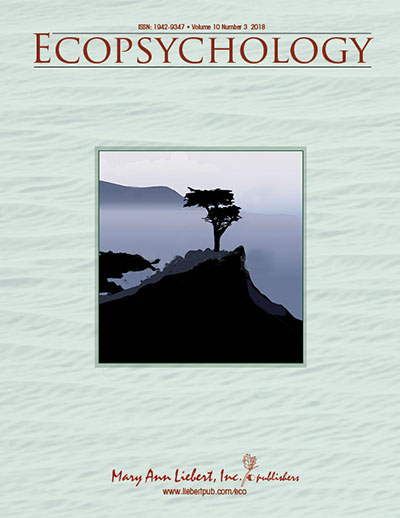Special Issue on Indigenous Decolonization and Ecopsychology
The journal Ecopsychology will publish a special issue at the confluence of two streams of scholarship: of ecopsychology and Indigenous Decolonization.
While ecopsychology can appear redundant in Indigenous cultures where psychology has not been disconnected from its natural origins, it has generally been supportive of Indigenous rights and sacred land, and brought forward the injustice of colonizer over Indigenous, and the imbalance of humans over Nature. Both ecopsychology and Indigenous cultures also often speak of humanity’s reciprocal relationship with Nature, and the need to restore and protect this relationship. Indigenous Traditional Environmental Knowledge (ITEK) forms a central part of this work.
It is also the case that the Rights of the Earth continue to gain standing worldwide, particularly in parts of the Americas with more densely populated Indigenous communities (i.e. Ecuador, Peru and Bolivia), resulting mainly from struggles for Indigenous Decolonization. But what of these rights in other parts of the world, and what role might ecopsychology and Indigenous Decolonization play in advocating that Nature be included in legal systems as a rights-bearing entity in countries like Canada, The United States, and Mexico? Consider, for instance, that in the interim, NAFTA is being renegotiated, largely ignoring the concerns of both Indigenous communities and the environment, sidelined by the priorities of Earth-damaging economics.
This special issue is interested in both empirical and theoretical papers—and evocative essays—that address this topic, broadly conceived. Relevant topics could include:
- How might Indigenous Traditional Environmental Knowledge inform ecopsychology?
- How might ecopsychology serve to support the Indigenous movement to decolonise?
- In what ways do ITEK and ecopsychology overlap or diverge?
- How might ITEK and ecopsychology combine forces to advocate the Rights of the Earth?
- To what degree might Western involvement in Indigenous Decolonization be construed as self-serving?
- Can economics abide by ITEK or the Rights of the Earth?
- Might Indigenous communities declare themselves “climate creditors:” owed support from the world’s large emitters?
- What discussions need to be generated regarding biopiracy and ITEK?
- Can ecopsychology address the specifics of current and historical injustice?
- What are the correlations between the violence against the land and the violence against Indigenous women?
Your contribution should be no longer than 4,500 words (excluding references) and submitted no later than January 7th, 2019. Please submit using the journal’s online submission portal.
Submission due date: January 7th, 2019
For questions, please contact guest editor, Adam Spires.
Ecopsychology is the only peer-reviewed journal that places psychology and mental health in an ecological context to recognize the links between human health, culture, and the health of the planet. The Journal seeks to reshape modern psychology by showing that it cannot stand apart from an intimate human connection with the natural environment. We need that connection with nature to do well mentally and physically, let alone to flourish, as individuals and as a species. Against this backdrop, the Journal publishes original scientific research articles, as well as theoretical papers, case studies, nature writing, and reviews of important books and other media.
Advantages of publishing in Ecopsychology include:
- Fast and user-friendly electronic submission
- Rapid, high-quality peer review
- Maximum exposure: accessible in 170 countries worldwide
- Open Access options available
